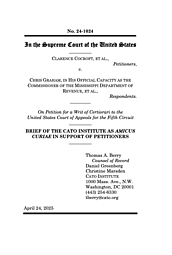Learn more about Cato’s Amicus Briefs Program.
Like most states, Mississippi has legalized marijuana in certain respects and has adopted a regulatory framework for its cultivation, sale, and use. Unlike most states, Mississippi seeks to ban marijuana dispensaries within its borders from advertising their products. Mississippi’s advertising ban is in significant tension with the protections that the First Amendment provides to ordinary commercial speech under the Supreme Court’s decision in Central Hudson Gas & Electric v. Public Service Commission (1980).
A group of dispensary operators sued, challenging Mississippi’s speech ban as a violation of their First Amendment rights to advertise their businesses. In defending the law, Mississippi asserted that such advertising is not protected by the First Amendment because federal law criminalizes commerce in marijuana and because speech about unlawful activity is not protected. Mississippi rests its argument on the first prong of Central Hudson’s commercial speech test, which asks if the restriction “concern[s] lawful activity.” Yet although marijuana is nominally criminalized at the federal level, Congress has for the last decade annually prohibited the Department of Justice from using federal funds to interfere with state medical marijuana programs. The unique status of marijuana under federal law suggests that labeling it as “unlawful” is a misnomer. The evidence on the ground in states like Mississippi shows that medical marijuana is clearly legal in practice. Nonetheless, the Fifth Circuit upheld Mississippi’s reasoning, holding that medical marijuana is illegal and therefore the dispensary advertisements are ineligible for First Amendment protection. The Fifth Circuit held that it did not matter whether the federal ban on marijuana was enforced or whether it even could be enforced.
Now the dispensary operators are asking the Supreme Court to take their case, and Cato has filed an amicus brief supporting their petition. In our brief, we argue that the Fifth Circuit applied Central Hudson too rigidly, because the court failed to consider the unique legal and regulatory context created by Congress’s ongoing policy of non-enforcement in the face of state medical marijuana legalization. Mississippi should not be permitted to simultaneously legalize medical marijuana while criminalizing all commercial speech about it. The state’s legal arguments ignore the significance of Congress’s prohibition on the use of federal funds against state medical marijuana programs. Mississippi’s policy of legalizing conduct while banning speech creates legal uncertainty, undermines established First Amendment protections, and disregards Congress’s express decision to defer to state marijuana law.
The Fifth Circuit’s strained understanding of “lawful activity” under Central Hudson has other troubling implications. The court’s opinion tells states that they may rely on outdated or unenforced statutes to justify suppressing commercial speech about conduct that occurs out in the open. The Supreme Court should take this case, reverse the Fifth Circuit, and protect commercial speech from pretextual restrictions.

This work is licensed under a Creative Commons Attribution-NonCommercial-ShareAlike 4.0 International License.


